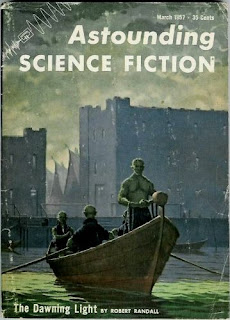"Harriman's home had been built at the time when everyone who could was decentralizing and going underground."
-Robert Heinlein, "The Man who Sold The Moon" IN Heinlein, The Man Who Sold The Moon (London, 1963), pp. 133-221 AT II, p. 146.
- as in James Blish's A Case Of Conscience (1958) where national populations inhabit not cities but Shelters.
"Above ground there was a perfect little Cape Cod cottage - the clapboards of which concealed armor plate and most delightful, skillfully landscaped grounds; below ground there was four or five times as much floorspace; immune to anything but a direct hit and possessing an independent air supply with reserves for one thousand hours."
- ibid.
The Harrimans employ domestic servants in their twenty-two underground rooms.
In Space Cadet and "The Long Watch," the Space Patrol prevents nuclear war on Earth by monopolizing nuclear weapons in orbit and on the Moon.
Poul Anderson's "Marius" is set in the aftermath of World War III which happened in 1958.
"The War of Judgment, he said, would by no means be the simple capitalist-versus-Communist slugfest which most of us imagined in the 1950's.
"'I've only the vaguest idea yet of what actually will go on.'"
-Poul Anderson, There Will Be Time (New York, 1973), V, p. 53.
However, this nuclear exchange, the Judgment War, is caused by environmental destruction which we will consider next.

6 comments:
Kaor, Paul!
I remember DD Harriman's underground house, which I thought rather cool! And I thought just now of Adrian Breze's house in Stirling's Shadowspawn books. A very large part of it was excavated from stone underground.
I don't understand your last sentence here. The War of Judgment we see mentioned in Anderson's Maurai stories, was a war fought with nuclear weapons. Not caused by environmental disasters.
Ad astra! Sean
Sean,
The War of Judgement was fought with nuclear weapons and "...was less ideological than ecological." (V, p. 53) "...it came...as a result of huge areas turning into deserts..." (ibid.)
Paul.
Kaor, Paul!
Now I get it. I should have paid attention to how you were quoting from THERE WILL BE TIME. I was thinking more of the Maurai short stories.
Ad astra! Sean
I tend to be skeptical about apocalyptic predictions. Note, for example, that for most of the history of life on Earth the planet has been much warmer than it is now; no polar caps, no glaciers, no snow, with subtropical forests in Antarctica.
And past climate transitions are increasingly shown to be very abrupt -- massive fluctuations within a single generation, with ice ages beginning and ending within a century or two.
Not that being caught in one would be a pleasant experience...
Kaor, Mr. Stirling!
I agree some caution and skepticism is often called for. I recall similarly apocalyptic predictions from the 1970's NOT coming to pass. Albeit I do agree on the desirability of phasing out fossil fuels for alternatives like nuclear power.
Quick onset of Ice Ages? We see precisely that in Jerry Pournelle, Larry Niven, and Michael Flynn's novel FALLEN ANGELS.
Ad astra! Sean
The problem is that this time the damage has started:
rising heat;
fires;
melting ice caps;
floods;
extreme weather.
Post a Comment